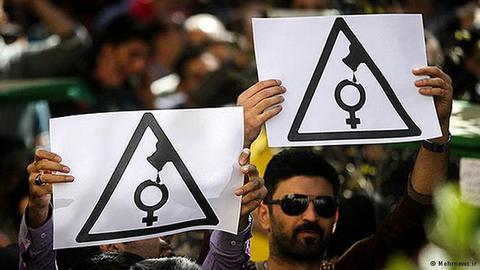On January 4, Ali Shariati marked his 65th day on hunger strike. The imprisoned civil rights activist is serving a five-year prison sentence for participating in an illegal gathering and conspiracy against the regime after he took part in a rally outside the parliament building in Tehran. At the rally on October 22, 2014, he and other protesters called for authorities to protect women and identify and arrest those responsible for a series of acid attacks that took place in Isfahan in 2014.
At the time, news of the attack had spread rapidly, and women lived in constant fear, not only in Isfahan but in other cities as well. Some women reported that they had not left their homes for weeks.
The attacks came soon after a bill was introduced in parliament in early October 2014, put forth to support so-called “promoters of virtue and forbidders of vice.” Prior to this, several Friday Prayers leaders made inflammatory remarks about women’s hijab and what they viewed to be declining standards in the way they were worn. “The question of hijab has gone beyond warnings,” Isfahan’s Friday Prayers Leader Yousef Tabatabi-Nejad declared. “To fight bad hijab we must raise our sticks higher and use force.”
Soon after, several women in Isfahan had acid thrown in their faces. Some people speculated that the perpetrators had responded to the call to “promote virtue” by throwing acid on women not wearing hijab in line with Islamic values.
Shattered Lives
At the time of their attacks, the victims were not dressed in full chador. The attacks all took place in the same neighborhood in Isfahan. Some of the women were attacked in their cars, while others were attacked in public places. Sohaila Joarkesh, who was 26 at the time, was one of those attacked in her car. On October 1, 2014, she was returning home after going swimming when her phone rang. She pulled to the side of the road to answer the call from her mother when she heard a motorcycle behind her. The next thing she knew, her face was burning and would not stop. She says it has still not stopped.
“The attacker approached the car on a motorcycle from behind and threw a lot of acid on her face,” says her father, Nasser Joarkesh. “It was so much that the acid ran down her face and burned her neck, her arms, her shoulders and her legs.”
The family has spoken about their devastation, and the experience of waiting outside operating rooms after the many surgeries Sohaila has undergone. Over the last two years, the physical and mental damage of the attack has mounted, although they try to remain positive when there are signs of improvement.
“Our lives are shattered,” Sohaila Joarkesh’s father said. “My own health has been affected. Every night we have to wake up and put drops in her eyes. We have to wash her and take her to the bathroom. Sohaila needs special care. She cannot be left alone. The smallest sound makes her scared and nervous.”
The criminals who did this to Sohaila Joarkesh and other women have never been identified.
Parliament passed the controversial and somewhat ambiguous bill on October 21, about three weeks after the attacks had started. When it was introduced, legislators did add a provision outlining that “a person or group has no right to commit criminal acts such as insult, libel, assault, inflicting injuries or murder in the name of promoting virtue and forbidding vice.”
Protests to Demand Action
Those attending the rally outside parliament, including Ali Shariati and his wife Motahareh Parsi, made sure their voices were heard. “Acid attack is a crime,” “Anti-women laws must go!” they shouted, and “Shame, shame, on our parliament!” Parsi said she had believed authorities had agreed to permit the rally, and only later learned that the gathering was unauthorized.
Similar protests took place in other Iranian cities, including Isfahan. Tehran’s Friday Prayers Leader ridiculed the public actions, describing the protests as the “enemy’s worn-out tactic.”
Ali Shariati did not face arrest at the time of the protest. Some months later, on February 18, 2015, Shariati was arrested and taken to Evin Prison. “I had just returned home from work when they raided his home and arrested him,” his wife told IranWire. “He was kept at Evin Prison’s Ward 209 for five months and was not granted a leave of absence until the day after his grandfather died. When he was on furlough he said that he was not going to accept the verdict. He requested a retrial but his request was rejected. When he was on furlough he went to Tehran’s Municipality for a personal matter. Security agents arrested him and he immediately went on hunger strike.”
Ali Shariati has been politically active — and so under the radar of Iran’s intelligence agents – since 2009 and the disputed presidential election. Before this, he only occasionally participated in political and civil rights activities. He was first arrested on February 14, 2011, and it is at this point when he began to be harassed. Prior to the acid attack rally, he was summoned and interrogated on a weekly basis. His wife believes this harassment was mostly due to his support for the nuclear negotiations and his work for Hassan Rouhani’s 2013 election campaign for the presidency.
Authorities did not just harass Shariati, they targeted Motahareh Parsi too.“Before his arrest [in March 2015],” she said, “we were planning to officially announce our engagement. But when Ali was arrested, I was summoned for interrogation as well. There they told me a lot of lies. The interrogator said that Ali was a drug addict and had relations with other women. He repeatedly said that Ali could not be the man of my life because he was going to spend years in prison.”
Marriage and Mourning
Since they were not married at the time, Ali Shariati and Motahareh Parsi could not even meet in prison. “We pleaded many times with them to give him a leave of absence for just a few days so we could marry and I could go to meet him,” she said. “For a year and a half I could not meet him except when he was sent to the hospital. When his grandfather passed away and they gave him a furlough we were forced to marry during [Iran’s religious] mourning period.”
For Parsi, the worst day she can remember was the first time she managed to get a glimpse of Shariati in the courtroom after he had been held in detention for five months. “On the day of his trial we were at Judge Salavati’s office when, like in a dream, Ali passed before my eyes,” she said. “They did not let him to get close to me. I had spent five whole months constantly looking at his pictures but suddenly I was watching a skinny, bearded man with a shaved head escorted by two thickset men. He just paused for a moment in front of me and our eyes met. That glance and that pleading in our eyes was a strange moment that has stayed with me like a nightmare.”
This “nightmare” has continued throughout Ali Shariati’s hunger strike. He has been in the prison’s clinic for the past 40 days under conditions similar to solitary confinement. If he is outside his room and a prisoner comes in, prison authorities push him into another room to hide him from the view of other inmates. He is not allowed to make contact with anybody, and for the past two months two guards have been with him at all times. “It looks like solitary confinement, not a clinic for treatment,” Parsi said.
Even the Prosecutor Believed he was Innocent
Before the appeals court changed his verdict, Shariati faced a long list of charges — from insulting the supreme leader to possession of a satellite dish — for which the lower court sentenced him to 12 years and nine months in prison. The appeals court dropped all the charges except “illegal assembly and conspiracy” and his sentence was reduced to five years. “In the appeals court,” his wife said, “the assistant prosecutor said that Ali was innocent even of illegal assembly and the conspiracy charge and that, at most, he could be charged with disrupting public order for his protest against the acid attacks. We wrote many letters and visited various officials and they were equally surprised by the verdict. But as of this moment, nothing has been done in response to his demands. I believe he is right to defend his rights.”
She says Ali Shariati called her on January 2 and told her that conditions had not changed for him in prison. He suffers from chronic weakness and dizzy spells. He faints when his blood sugar and blood pressure plummet. He has difficulty breathing and is half asleep day and night.
Condoning Censorship, Promoting Virtue, and Fruitless Investigations
In the summer of 2015, Abolfazl Torabi, a member of the parliament’s Judiciary Committee, announced that in the previous year, 300 acid attacks had taken place in Iran. He also said criminals were turning to the crime with increasing regularity. In his view, promoting “Islamic lifestyles” was the most reliable way of reducing attacks. Publishing news about what had happened would only scare people. Even the Judiciary Chief Sadegh Larijani said the media had done an “injustice” to the regime by publishing news about the attack.
At the same time, President Rouhani promised that the country would not rest until those responsible for the attacks were arrested.
But the only person who has been punished is someone who protested against what was happening. After more than two years, no perpetrator has been identified, let alone arrested or punished. Instead, Ali Shariati is in prison and on hunger strike.
“They have not given us any information,” said Nasser Joarkesh, the father of acid attack victim Sohaila Joarkesh. “They say investigations are ongoing and are not complete.”
He told IranWire he does not like to talk a lot about his daughter’s situation. His priority is treating her eyesight and dealing with her other problems. The burns are improving but her eyes need further surgery and treatment. When she was most recently released from hospital in late December, the doctors prescribed complete rest. “The doctors could not do anything about her right eye,” Nasser Joarkesh said. “But the nerve of her left eye is partly undamaged. They did multiple surgeries on her left eye and she was able to see a little after they implanted a micro camera. But after eight months the muscles went weak and could not hold the camera. This damaged the retina and the doctors have prescribed complete rest so that at a later date they will be able to perform surgery on the retina.”
Sohaila Joarkesh’s father knows about Ali Shariati. “Of course I know him, only through the news,” he said. “I was very sad to hear about his condition. I believe he should end his hunger strike.” His thoughts go out to Shariati’s family too. “We are in shock,” he said. “His family must be very worried, too. God willing, something will happen to save him from the situation he is in.” He was silent for a few moments before adding: “Would that such things did not happen in this country, in this land.”
visit the accountability section
In this section of Iran Wire, you can contact the officials and launch your campaign for various problems



























comments